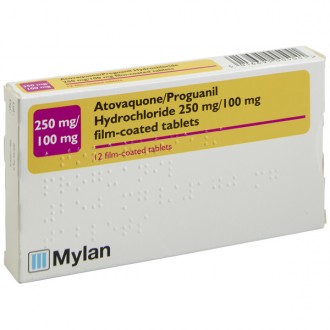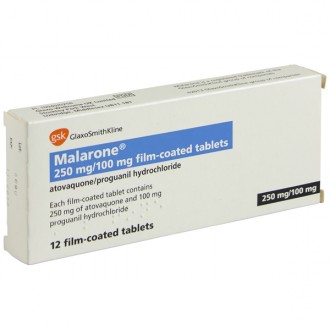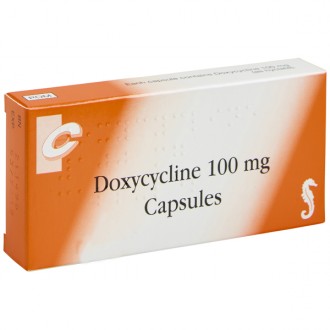Malaria is a serious tropical disease caused by Plasmodium parasites; these parasites can be transmitted through bites from infected female mosquitoes. More than half of cases and deaths of malaria are in sub-Saharan Africa.
Prevention of malaria is key when travelling to countries where risk of malaria is high. Antimalarial tablets are highly recommended before, during and after you travel and are available from Pharmacy Online. Speak to one of our experts to find the right option for you.
What is malaria?
Malaria is a life-threatening disease caused by parasites that are transmitted to people through the bites of infected female Anopheles mosquitoes. It's a serious global health issue, particularly in tropical and subtropical regions. The World Health Organisation estimates that in 2020, there were 241 million cases of malaria worldwide, leading to 627,000 deaths.
The disease is preventable and curable, but its impact is devastating, particularly in poorer countries with limited access to healthcare. Understanding malaria, its risks, symptoms, and treatment options is crucial in combating this disease.
Risk factors for malaria infection
The primary risk factor for malaria is residing in or traveling to areas where the disease is prevalent. These include parts of Sub-Saharan Africa, South Asia, and South America.
Other risk factors include:
- Lack of protective measures, such as insecticide-treated bed nets, and insect repellent.
- Limited access to effective antimalarial medicines.
- Specific groups, such as pregnant women, infants, and travelers from non-endemic areas, are at higher risk.
Effective treatment reduces the risk of severe disease progression, complications, and transmission. Prompt and accurate diagnosis followed by effective treatment is crucial in managing malaria cases.
Prevention strategies, such as mosquito control e.g. mosquito nets and repellents, and prophylactic antimalarial medicines, play an equally vital role. Together, treatment and prevention are key to reducing the impact of malaria globally.
Symptoms of malaria
Malaria symptoms vary but typically include:
- Fever
- Chills
- Headache
- Nausea and vomiting
- Muscle pain and fatigue
If left untreated, malaria can lead to serious complications, including seizures, coma, and even death.
Symptoms usually appear 10-15 days after the infective mosquito bite but can be mild and difficult to recognise as malaria.
Causes of malaria
Malaria is caused by Plasmodium parasites. These parasites multiply in the liver and then burst out and infect red blood cells. The parasites are spread to people through the bites of infected Anopheles mosquitoes, which mainly bite at dusk and night.
Four types of malaria parasites infect humans: Plasmodium falciparum, P. vivax, P. ovale, and P. malariae. P. falciparum is responsible for most malaria-related deaths globally.
Types of malaria parasites and transmission routes
- Plasmodium falciparum and Plasmodium vivax: Most common, with P. falciparum being the most deadly.
- Plasmodium ovale and Plasmodium malariae: Less common.
- Transmission Routes: Mainly through the bite of an infected Anopheles mosquito. Rarely, it can also be transmitted congenitally, through blood transfusions, or via shared needles.
Diagnosing malaria
Malaria is diagnosed using blood tests to look for the presence of the parasite. The most common tests are:
- Microscopic examination of blood films.
- Rapid diagnostic tests (RDTs) that detect antigens derived from malaria parasites.
Early diagnosis and treatment are crucial for recovery and preventing the spread of the disease.
Malaria treatment
There are several different treatment options available for malaria, including:
- Artemisinin-based combination therapies (ACTs): ACTs are the first-line treatment for malaria and are highly effective at killing the parasites that cause the disease, and have minimal side effects. ACTs are typically taken for three to five days.
- Other antimalarial drugs: There are a number of other antimalarial drugs that can be used to treat malaria, such as atovaquone-proguanil, doxycycline, or mefloquine, but they're generally only used when ACTs aren't suitable, or when resistance to ACTs is suspected.
- Supportive care: In addition to medication, people with malaria may also need supportive care, such as fluids and electrolytes to prevent dehydration, and rest to help their bodies recover.
How to choose the right treatment
The specific treatment option that is best for you will depend on a number of factors, including:
- Parasite species: The type of malaria parasite causing your infection dictates the most effective treatment. Plasmodium falciparum is the most dangerous, while Plasmodium vivax, can cause relapses.
- Individual characteristics: Age, pregnancy, breastfeeding, and overall health status play a crucial role in treatment selection. Certain medications may be unsuitable for pregnant women or individuals with specific health conditions.
- Travel history: Recent travel to areas with malaria endemicity increases the risk of infection. Knowing the specific region visited helps healthcare professionals assess the likelihood of resistance to certain antimalarial drugs.
- Allergy or medical conditions: Past allergic reactions or existing medical conditions, such as liver or kidney disease, must be considered to avoid potential complications.
The effectiveness of each treatment
- ACTs are generally highly effective at treating malaria and can cure the infection in most cases.
- Other antimalarial drugs can also be effective, but they may be less effective than ACTs and may have more side effects.
- Supportive care can help to improve the person's overall health and reduce the risk of complications.
It's important to adhere to the prescribed treatment regimen for malaria, even if you start to feel better after a few days. This is because the parasites may not be completely killed if you don't finish your course of medication.
If the parasites aren't completely killed, you may develop a recurrence of malaria, which can be more difficult to treat.
Due to the complexities of malaria treatment and the need for personalised care, seeking guidance from healthcare professionals is paramount. They can assess individual factors, review your medical history, and recommend the most appropriate treatment regimen, ensuring optimal outcomes for you.
Preventative measures and tips
Preventing malaria is as crucial as its treatment. It starts with environmental control:
- Eliminate standing water to reduce mosquito breeding.
- Use insecticides and mosquito repellents for added protection.
- In high-risk areas, sleeping under insecticide-treated bed nets is essential.
- Personal protective measures include wearing long-sleeved clothing and applying mosquito repellents containing DEET.
- Additionally, prophylactic antimalarial medication is advisable when traveling to endemic regions.
Antimalarial medicines
Antimalarial medication is a preventative measure to be taken before, during and after a trip to areas where the malaria parasite is prevalent.
Common options include chloroquine, doxycycline, mefloquine, and atovaquone-proguanil. The choice depends on your destination, as the effectiveness varies based on local malaria resistance patterns.
As no medication guarantees 100% protection, they should be used alongside other preventive measures such as mosquito nets and repellents.
Be aware of potential side effects which can vary with each medication. For example, mefloquine is not recommended if you have a history of psychiatric disorders, while doxycycline can increase skin sensitivity to sunlight.
Complications of malaria
Malaria can lead to severe complications if not treated promptly. These include cerebral malaria, where brain function is affected, potentially causing seizures, coma, and in severe malaria cases, death. Anemia and hemolysis are common, as the parasite destroys red blood cells. Malaria can also cause acute respiratory distress syndrome, impacting lung function.
In pregnant women, it increases risks of miscarriage, premature birth, and low birth weight. The disease can damage organs like the kidney and liver, leading to organ failure. Repeated infections can result in chronic health issues, including an impaired immune system and spleen enlargement.
Taking preventative measures is vital if you're in high-risk areas. Equally important is seeking prompt medical attention if malaria is suspected. Early detection and treatment can prevent these severe complications, saving lives and reducing long-term health impacts.
Side effects of malaria treatment
Malaria treatment, while essential, can sometimes lead to side effects. These vary depending on the specific medication used.
Common antimalarial drugs and their potential side effects include:
- Chloroquine: Can cause mild side effects like nausea, vomiting, abdominal pain, headache, and itching. Rarely, it may lead to vision problems or exacerbate psoriasis.
- Artemisinin-based Combination Therapies (ACTs): These are generally well-tolerated, but some people might experience nausea, diarrhea, dizziness, or an allergic reaction.
- Atovaquone-proguanil (Malarone): Possible side effects include stomach pain, nausea, vomiting, and headaches. In rare cases, it can cause mouth sores or allergic reactions.
- Mefloquine: Known for more pronounced neurological side effects like dizziness, sleep disturbances, anxiety, and, in rare cases, severe psychiatric reactions. It's not recommended for those with a history of mental health issues.
- Doxycycline: Common side effects include gastrointestinal upset, sun sensitivity, and an increased risk of yeast infections. It should not be used by pregnant women or children under 8 due to the risk of tooth discoloration.
- Primaquine: Can cause stomach cramps, nausea, and heart rhythm changes. It's contraindicated in people with G6PD deficiency due to the risk of hemolytic anemia.
It's important to discuss potential side effects with a healthcare provider, who can help weigh the risks and benefits of each treatment option. Moreover, they can monitor and manage any adverse effects that occur during treatment.
Buy malaria treatment from Pharmacy Online
Buy malaria treatment online from Pharmacy Online. We offer a wide range of MHRA-approved and World Health Organisation recommended antimalarial medications. Our service is convenient and easy to use, with fast delivery and transparent pricing. Plus, our expert pharmacists are available for guidance and consultations, ensuring you get the right treatment for your needs.








